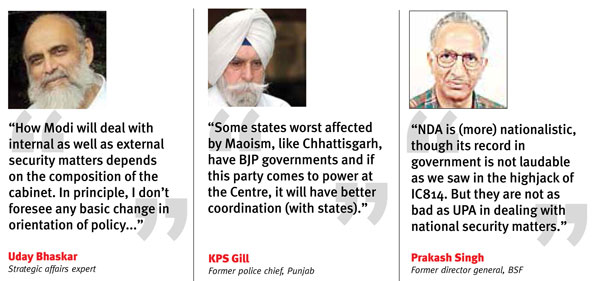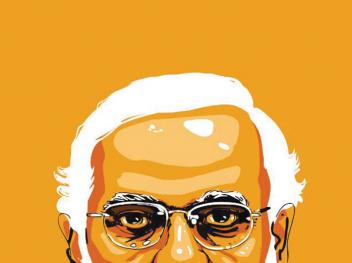Nobody is expecting a sea change in the national security-related matters, but the upcoming NDA government is expected to address Naxalism, terrorism and illegal immigration better
If there is one area for which it is difficult to predict how a Modi government will work, it is internal security – beyond an aggressive approach of a Hindu nationalist. Also, if there is one area which can turn up a Waterloo for Modi, it is internal security. Much of internal security is part of the state domain, and the PM and the home minister will have to patiently coordinate with the states to face the numerous challenges.
Former intelligence bureau (IB) chief Arun Bhagat lists these challenges before the new government: Naxalism, terrorism and illegal immigration. He says, “One hopes a Modi government will handle these issues with objectivity in a fair and effective manner.”
Prakash Singh, a former Border Security Force (BSF) director general who is a member of the national security council, points out, “In the last 60 years we have had no national security doctrine the way countries like the US and Britain have. Though we have a national security council and a national security advisory board, there is no security doctrine to guarantee national security. The nation needs a clear-cut policy on this and one hopes the new government will deal with national security with clarity of mind.”
In particular, the former top cop feels there is no well-defined policy when it comes to tackling the Maoist violence as some political leaders, in states and at the centre, favour outright counter-insurgency operations while others argue for a calibrated approach and using development to counter the propaganda. “Leaders like Chidambaram talk of ‘clear, hold and develop’ policies while others like Nitish Kumar and Digvijay Singh talk of development as the best tool to fight Naxalism. The nation should have a single approach in tackling Maoists, and the incoming government will hopefully deal with it better,” Prakash Singh says.
Also Read:
Retired super-cop KPS Gill speaks candidly in favour of a Modi-led government, which he expects will be far more effective in dealing with security challenges. “Some of the states worst affected by Maoism, like Chhattisgarh, have BJP governments and if this party comes to power at the centre, it will have better coordination (with states). A BJP government will give better political direction as institutions dealing with various forms of terrorism are already in place and (what is needed now is) strong political will,” says Gill, who worked as advisor to the Gujarat government for a while and helped bring the 2002 riots under control.

Also, “he (Modi) has the experience of fighting terror in the state and I believe a BJP-led government will be better at curbing the menace of terrorism in the country,” adds Gill.
Among other major flash points are Kashmir and the Northeast. “Manipur is again facing widespread unrest and there is complete chaos as the government has failed to deal with (people’s) grievances. Whoever creates unrest is invited for peace talks. It is turning out to be futile. Only the presence of security forces is not letting insurgents do what they want,” says Praksah Singh.
Uday Bhaskar, an expert on security and strategic affairs, says, “How Modi will deal with internal as well as external security matters depends on the composition of the cabinet. In principle, I don’t foresee any basic change in orientation of India’s policy in dealing with the security of the country.”
Former research and analysis wing (RAW) officer RK Yadav is a bit sceptical about Modi’s capacity to handle security better. He says: “Modi will be new at the Centre, so he will have to come out of the bureaucratic tangle as they (officials) normally don’t have proper understanding of ground realities. To have better internal security, a Modi government will have to have separate policies for different neighbouring states.”
Another challenges before the new government will be police reforms, as the existing security policies and the primary instruments for tackling law and order and internal security have not been able to cope with the growing challenges. “Till today, no government has done anything on this issue. I have seen the manifesto of both BJP and Congress: of the two, BJP has talked of independence of police. I believe independence is a bigger word but merely autonomy will do a great service to the nation,” says Prakash Singh.
On the whole, nobody is expecting a sea change. “The NDA is comparatively (more) nationalistic, though its record in government is not laudable as we saw in the highjack of IC814. But they are not as bad as UPA in dealing with national security-related matters,” sums up Prakash Singh.
(This was part of the cover package of April 16-30 print issue)

